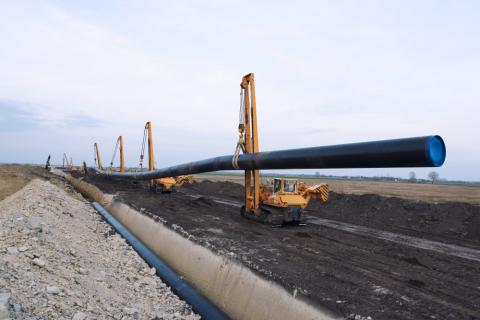Reactions to study estimating the economic impact of the energy crisis on households around the world
A study estimates that household energy expenditure has increased by 62.6 to 112.9 % in 2022, following the Russia-Ukraine conflict. This represents an increase of 2.7 to 4.8 % of overall household expenditure. The analysis, published in Nature Energy, warns that this increase could push between 78 and 141 million people worldwide into extreme poverty.

Sergio Tirado-Herrero - crisis energética EN
Sergio Tirado-Herrero
'Ramón y Cajal' researcher specialising in energy poverty at the Department of Geography, Autonomous University of Madrid
The paper 'Burden of the global energy price crisis on households' by Guan et al. (2023) represents a valuable example of problem-oriented research and is highly relevant in the context of the international energy price crisis following the invasion of Ukraine by the Russian Federation. The authors use an input-output model applied to a global database with detailed information on 201 categories of household expenditure in 116 countries to determine that the tensions in international energy markets since 24 February 2022 are having clear negative short-term effects on household budgets (especially energy) for households around the world, albeit unevenly across regions, countries and income levels.
Of particular concern is the result obtained for global figures on the prevalence of energy poverty, measured as the percentage of households in a country that spend more than 10% of their household budget on paying household energy bills. According to the study, it is estimated that between 166 and 538 million people in the 116 countries analysed will move into energy poverty, according to the above expenditure indicator as a result of the generalised rise in energy prices. In addition, it is estimated that the energy price crisis caused by the war in Ukraine will have a direct and indirect impact (i.e. also through food products and other consumer goods that depend on energy prices) that will increase the incidence of extreme monetary poverty - i.e. people whose disposable income is less than USD 2.15 per day in purchasing power parity units - by 78 to 114 million people. This is equivalent to 1.2 - 2.1 % of the global population.
These estimates are indicative of a certain risk of worsening material living conditions for the most disadvantaged segments of society globally. The findings of the study are therefore a call to governments and decision-makers to provide support for vulnerable households to cope with the current crisis in the cost of basic goods and services, especially food and energy. This support is already being provided in the form of fiscal measures such as tax rebates on energy products, discounts and subsidies on energy bills and caps on final energy prices which are, in part, pre-existing tools reactivated or reinforced in the context of the current crisis. But it should also be borne in mind that their application, without taking into account income or vulnerability criteria (through, for example, universal discounts on motor vehicle fuels), conflicts with the unavoidable objectives of decarbonising global economies in the medium and long term in order to tackle the climate emergency.
He declares that he has no conflict of interest with the authors of the article reviewed or with the work itself.
Rosa Mª Regueiro Ferreira - crisis energética EN
Rosa Mª Regueiro Ferreira
PhD Professor in Applied Economics at the University of Santiago de Compostela, researcher in Economics of Energy and Natural Resources
The article 'Burden of the global energy price crisis on households' by Yuru Guan et al, published in the journal Nature Energy, presents a model for estimating the impact of rising energy prices on households.
The model is characterised, among others, by three elements:
- Incorporating direct and indirect assessments of the impact of rising energy prices through expenditure groups representing populations with different levels of consumption, which in turn correspond to 116 countries in the world.
- Create scenarios of the evolution/impact of the prices of the main fossil fuels and direct derivatives (coal, oil and natural gas). The time period considered is from February to September 2022.
- Consider the input/output level on a multi-regional basis to analyse in more detail the impact of price changes on household energy budgets.
The authors conclude as a result that households' energy costs increased by between 63% and 113%, resulting in an increase of between 2.7% and 4.8% in household expenditure, which translates into an increase in poverty in general and energy poverty in particular.
These results are compatible with the energy and supply crisis situation resulting from the war in Ukraine, the dependence on energy supplies and the geopolitical tensions involved. The reaction of the governments of the affected countries was to implement shock absorption and direct aid packages, as well as to reduce dependency on energy and material supplies from the conflict zone.
Undoubtedly, the authors are right to call for specific action for the most affected population, which limits or prevents access to basic goods and services, although I would also recommend addressing the incorporation of renewable energy prices into the model, the impact of the energy pricing system itself and its relationship with the financial system.
Paloma Taltavull - crisis energética EN
Paloma Taltavull
Professor of Applied Economics at the University of Alicante
The article seems to be a mixture of concepts to build a publication, rather than a paper with concrete findings.
The title indicates that the objective is to assess the effect of the energy crisis on household consumption. According to the abstract, it does this for 201 expenditure groups in 116 countries. It then says that it decomposes the indirect impacts of rising energy prices on 33 household expenses, but this is introduced after several descriptive paragraphs that have another objective and it does not say how or in what context it does so. In this section, in which the authors are expected to describe how and where price increases affect consumption, there are descriptions and graphs that have no source and are assumed to be the authors' product, but are unsubstantiated.
The paper then jumps to energy poverty. There are insufficient references to existing studies on energy poverty, which are many. It does not calculate how much energy poverty there is, nor does it provide any method of estimation.
The article then moves on to conclusions without developing an analysis. The paper claims to analyse the effect of an increase in energy prices on household consumption, and these are not represented individually (let alone by type of expenditure) in the Input-Output Tables (IOTs). As far as I know, IOTs are used to assess intra-industry relationships in an economy and estimate the shock that any change in final demand produces on the equilibrium within the economy itself, i.e. not what this study claims to do.
In my view, the analysis is inconsistent with the methodology. By definition, IOTs refer to one year, but the authors take daily data from January 2021 to September 2022; moreover, differentiating prices by energy products, but taking consumption data for 2019, tables for 2017, and the 2011 expenditure structure.
The authors say they use tables published by the Global Trade Analysis Project, GTAP11, which is a database prepared to estimate the effects of international trade. As this article explains, they modify the IOT coefficients, but they do not say for which sector.
There is no indication of which consumer groups, which countries and which expenditure groups they assess. The source information is a key element that allows us to believe that the analysis offered in the article is real, the data true and not created for the purpose of finding evidence, but it is not described here.
Finally, the conclusions do not say anything new, do not refer to the results of the exercise and therefore do not summarise what they demonstrate or find. They do not refer to the effects obtained from their change in IOTs, for example.
Roberto Barrella - crisis energética EN
Roberto Barrella
Researcher at the Chair of Energy and Poverty at Comillas Pontifical University
This is a study with good scientific quality and high potential to serve as an international reference on the impact of the global energy crisis derived from the conflict between Russia and Ukraine. The databases used for the analysis - Global Consumption Database (World Bank, 2022) and The Global Trade Analysis Project (GTAP) Data Base - contain relevant and statistically sound information.
One of the most interesting findings is the comparison of the distribution of the energy burden between high- and low-income countries: energy inequality (in terms of disproportionate expenditure in proportion to income) is more acute in developed countries, i.e. poorer households have a much higher share of expenditure in income than high-income households. This result is in line with the findings of the annual energy poverty report of the Chair on Energy and Poverty on the disproportionate expenditure of Spanish households: the Spanish report points to a higher energy burden (relative to income) for households in the lowest income deciles. On the other hand, the Chair's study highlights that many of these low-income households tend to reduce their energy expenditures well below their needs, thus finding themselves in a situation of hidden energy poverty.
From another perspective, at both ends of the economic classification of the countries in the international study, there is a much higher weight of the indirect or secondary burden, i.e. goods and services that are not primary fuels (electricity is included in these goods). Along these lines, the Red Cross has launched a study in Spain to analyse the impact of the inflationary crisis on the economies of vulnerable households, in particular on energy poverty.
Another piece of data from the study published in Nature Energy that aligns with the Spanish evidence is how this crisis is exacerbating global energy poverty (between 2.4 % and 7.9 % more of the world's population) and extreme poverty (between 1.2 % and 2.1 % more of the world's population).
A potential limitation of this study is the fact that the pre-crisis baseline scenario has been set with average prices in 2021. In many countries (including Spain), energy prices started to rise from mid-2021 onwards, driven by the post-pandemic economic recovery and tensions in world markets. Thus, the study may have underestimated the relative increase in energy prices, i.e. the authors' choice may have reduced the estimated impact of the energy crisis.
This quantitative study can improve the information we have on the impact of the energy crisis on household economies globally and help correct both short-term emergency response and medium- to long-term strategic planning.
Furthermore, the authors of the Nature Energy study conclude that the cost-of-living increases experienced by households around the world reflect the limited capacity of economic agents to adopt new technologies and switch to other fuels in the short term. Furthermore, the study sheds light on the multiple impacts of the conjunctural policies implemented by governments in several countries: this article highlights that, in the short term, they have alleviated the negative socio-economic consequences of this crisis, but the secondary effects of these measures could worsen our carbon dependence, slow down the energy transition and further delay already insufficient global efforts to mitigate climate change.
Yuru Guan et al.
- Research article
- Peer reviewed
- Modelling



